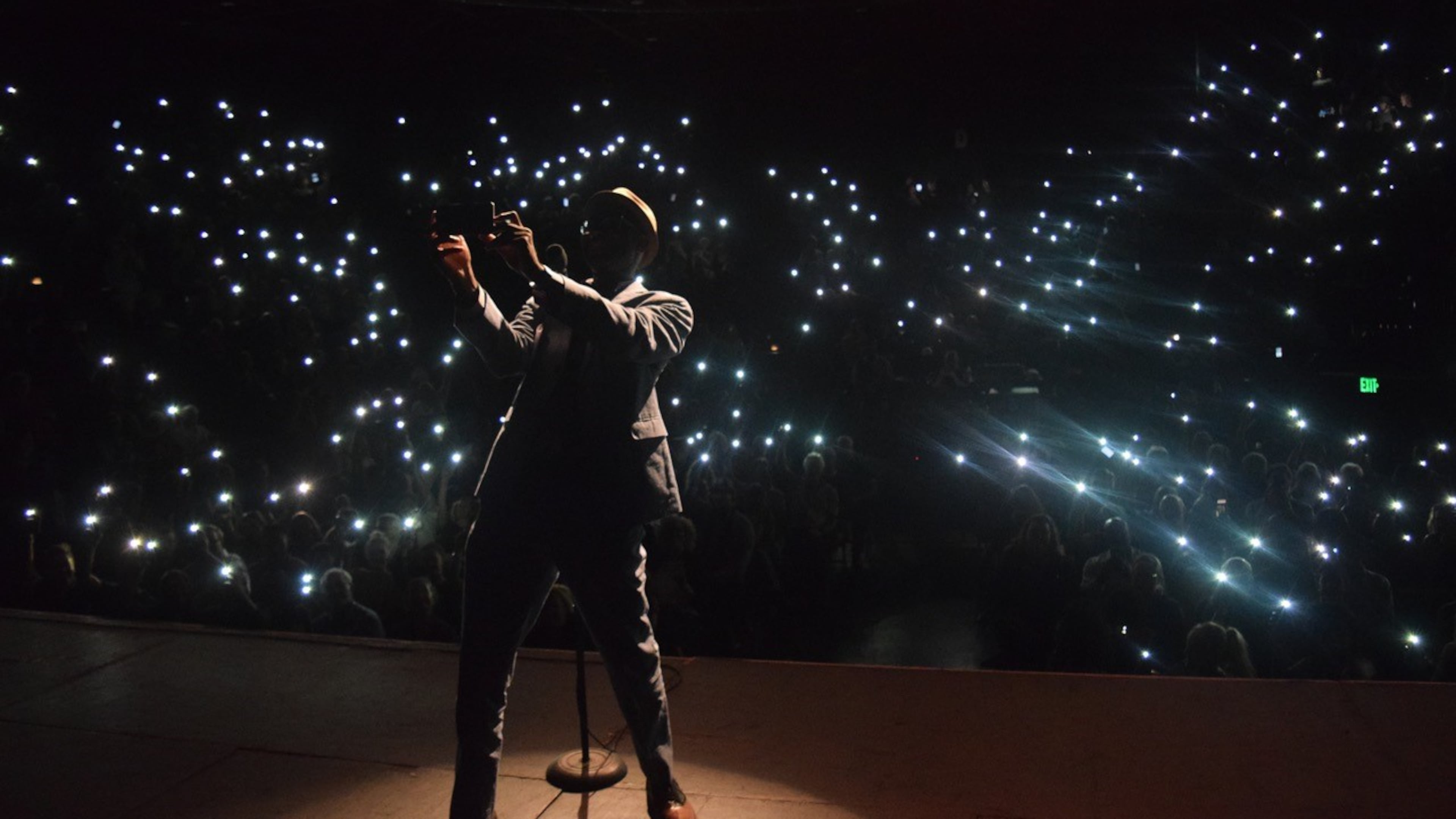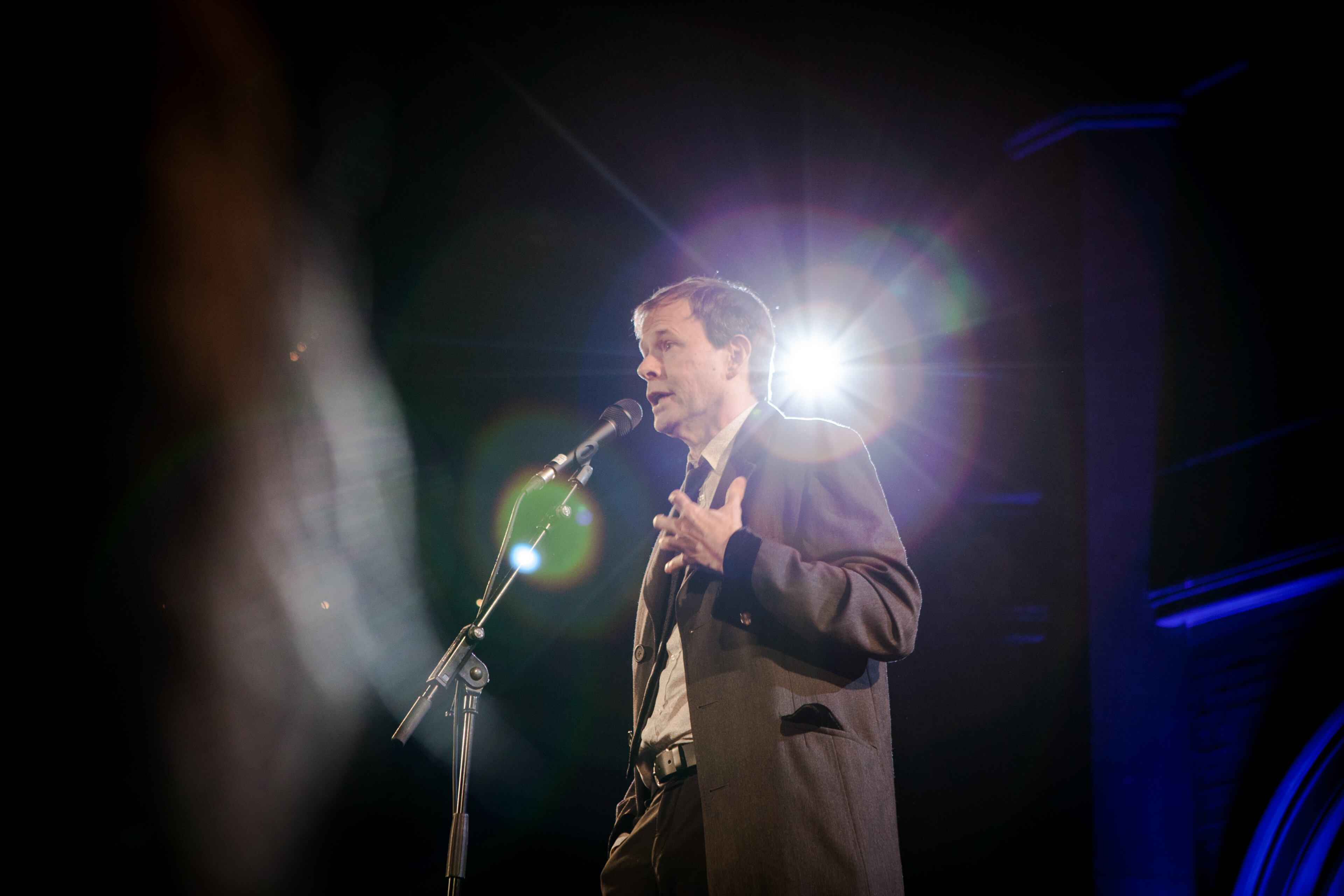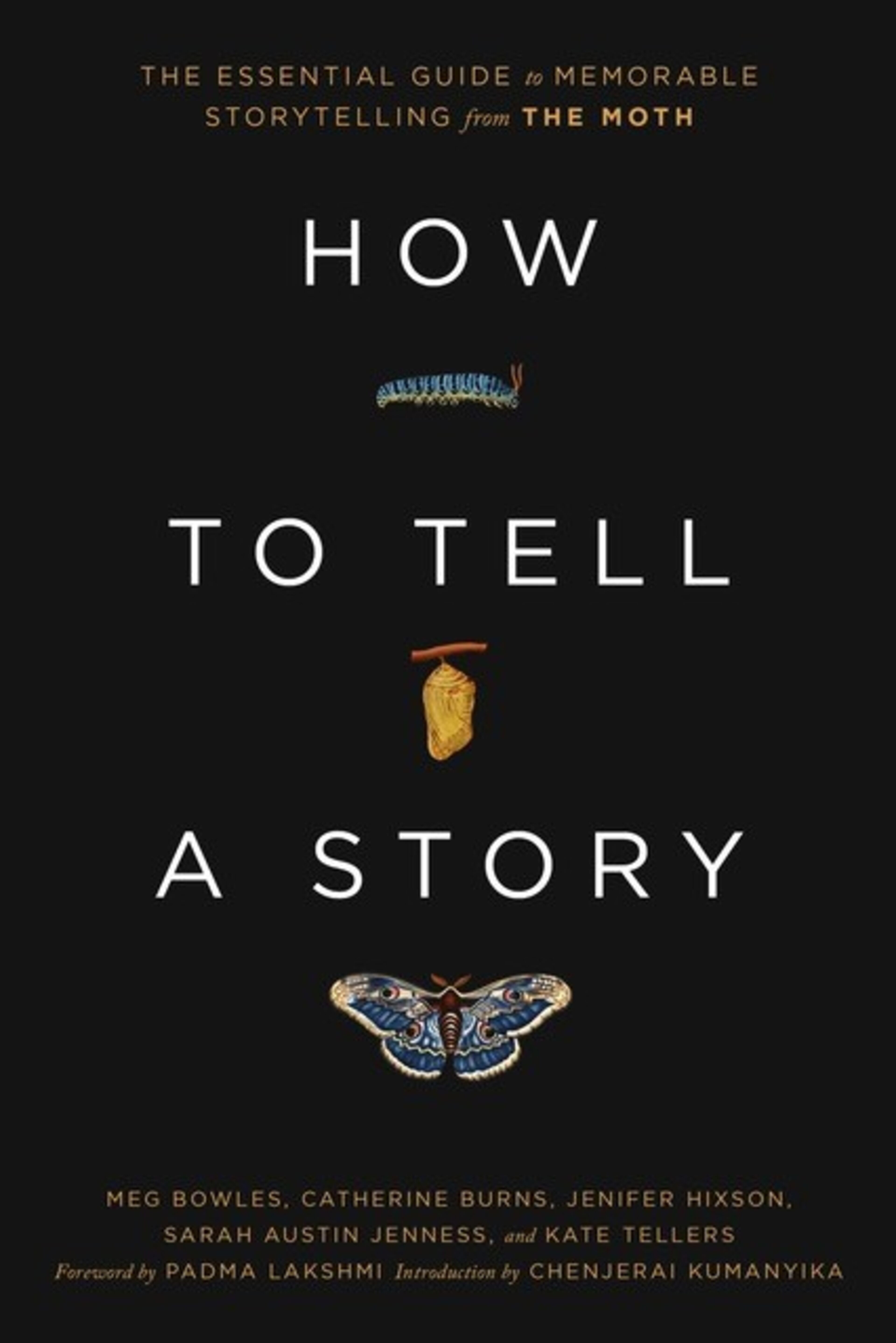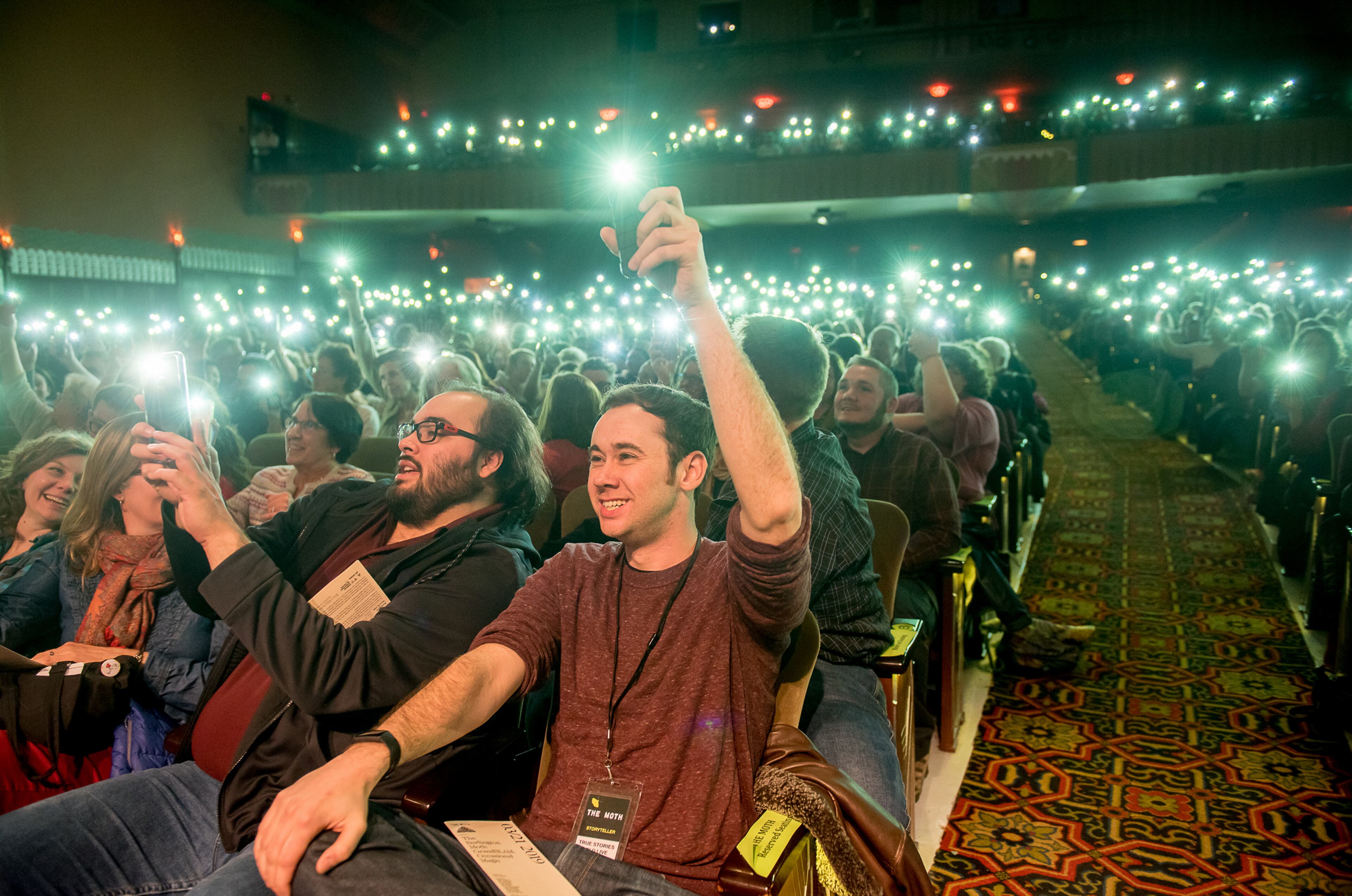The Moth: a story-telling movement with a new book on narrative skills

One day Catherine Burns was sitting in the passenger seat of her friend Alex’s car, parked at a mini-mart, waiting for him to emerge with a cup of coffee.
Bored, she wanted to listen to the radio. The keys were in the ignition. She reached over and gave them a twist.
Mistake. Alex’s car was a standard shift. He’d left it in first gear. The starter motor drove the car over a small concrete curb and off the 10-foot cliff at the edge of the parking lot.
The police officer who arrived at the nose-down vehicle shortly thereafter asked the question, “Who was driving the car at the time of the accident?” leading Burns, who was uninjured, to answer: “No one, sir.”
That story (and that innocent but droll exchange) delivered to a small audience at a New York Moth StorySLAM back in the year 2000, helped Burns tie for first place in her first competition.
It also propelled her into the Moth organization, where she volunteered to help the non-profit with communications and education, and where she eventually became The Moth’s artistic director.
This year Burns, a native of rural Alabama, has co-authored a book, “How to Tell a Story: The Essential Guide to Memorable Storytelling from The Moth” (Penguin Random House, $28). The publication is one of several events celebrating The Moth’s silver anniversary this year.
What is The Moth? It is the brain-child of Georgia native and novelist George Dawes Green, who, after moving to Brooklyn, meditated on a favorite childhood experience: sitting up late at his St. Simons home, listening to his older relatives spin tales. (Later on, when Green was a young adult in Brunswick, story-time included flying nocturnal insects, that gave The Moth its name.)

Green somehow transplanted that experience to his New York City apartment and created a regular get-together of storytellers.
“That first Moth was a gorgeous mess,” recalls founding board member Melvin Estrella in the new book. “The stories were so long, we ran out of wine!”
Green tinkered with the ground rules. Each Moth meeting would have a curator, a different theme and sometimes an exotic locale. Participants would adhere to a time limit. The stories would be true. There would be no notes and no interruptions.
In 25 years, The Moth has grown exponentially. It hosts StorySLAMS in 28 cities including London, England, Melbourne, Australia, and Atlanta. Those are open-mic invitationals where anyone can put their name in the hat to be selected at random to tell a story on a specific theme.
There is also The Moth Mainstage, a touring show that has hosted such storytellers as Mike Birbiglia, Rosanne Cash, Elizabeth Gilbert, Malcolm Gladwell, Amanda Gorman, Lin Manuel Miranda, Molly Ringwald, John Turturro and many others.
The Moth Radio Hour, presented weekly by PRX on more than 575 radio stations, and The Moth Podcast, downloaded 90 million times a year, reach a huge audience. And there are Moth storytelling workshops for high school and college students and for adults.
At The Moth it is an article of faith that learning how to tell a story is a critical skill, a tool of self-discovery, and that stories can rewrite the way a community, or even a nation, sees itself.

Most of all, telling a personal tale, in a room of attentive listeners, is a pathway to a unique union. “Some of the best nights at The Moth can seem as though the storyteller and everyone in the audience are breathing the same breath,” the authors write.
Moth stories that are heard on the Mainstage or on the radio show and podcast, come from the heart of the teller, but are cultivated with the help of a Moth director. Moth staffers pepper the storyteller with questions, they help find the emotion behind anecdotes and help the teller distill meaning from the events of his or her own life.
For those of us at home, the writers of “How to Tell A Story” suggest using the book itself as a guide to unearthing and polishing the personal story inside each of us.
Here are a few of the guidelines:
Time yourself
Mainstage stories are limited to 10 to 12 minutes. StorySLAM participants get only five minutes.
Practice out loud
Speak your story to a sympathetic listener before bringing it out at the next dinner party.
Don’t try to be the hero
“We teach in the book: Be willing to tell on yourself,” said Burns. Focus on “not the time you saved the day, but the time you maybe messed up. People relate to you much more.”
Don’t memorize
“The only people at The Moth who have ever stopped their story and not gone on are people who have memorized their talk,” said Burns. “If you have it memorized, you have to remember the words. If you haven’t memorized it, you only have to remember the beats.”
Exception: Do memorize your first and last lines:
The intro and dismount are crucial.
Your story needs to be true
“But there are always embellishments along the way,” said Green. “We don’t have a police force, we don’t have the Moth Investigative Agency,” so The Moth depends on its speakers to hew, more or less, to the facts.
Atlantans can get a taste of a live Moth event June 13 at the Theatrical Outfit’s downtown Balzer Theater during the monthly StorySLAM hosted by the theater group. The theme this month is birthdays.
“I don’t think we’ve ever had a night when we haven’t been sold out,” said Jon Goode, a poet, a writer of television commercials and the host of the Atlanta slam.
The Moth draws much of its fan base from the NPR show. “That audience skews older and white,” said Goode, who added that he and Atlanta producer Meredith Danielle work hard to draw a more diverse crowd that is “Black, white and somewhere in between.”
While the world tries to tell us how different we are, “when you listen to these stories, you realize how much we have in common,” he said.

Green, 69, said that 25 years ago the idea that customers would pay to sit in a room and listen to tales from non-famous people was considered strange, if not revolutionary.
“When I went to my friends, every one was skeptical.”
They asked him: Don’t you need music? How about just one story? Why not focus on children’s stories? “No one had ever put on a night of personal stories.”
Now, he said, there are hundreds of presentations a month. “We may be the largest theatrical production company in the world, when you consider all the shows that we’re producing. I once saw somebody wrote somewhere that The Moth was the first global movement to come out of South Georgia since the Girl Scouts.”
Speaking the night before The Moth’s annual Moth Ball — a Silver Ball this year — held in New York City with David Byrne as the guest of honor, Green acknowledged that there can be a dark side to the power of stories. They can be used to generate false narratives and to manipulate others for nefarious purposes.
As an example, Green, an eighth-generation Savannahian, said the lure of antebellum mythology was strong in his family. “When I was a boy I was listening to these Lost Cause stories handed down from generations, which had a profound influence.”
The Moth intends to undo that kind of bullhockey by surfacing stories that have been suppressed and expanding our narratives to include those who have been left out.
Green’s newest novel, “The Kingdoms of Savannah,” due out in July, will work toward the same goal, he said. “There will always be this evasion that allows us to keep those old stories,” he said. “I don’t know, maybe these stories will change that.”
EVENT PREVIEW
The Moth StorySLAM. 7:30 p.m., Monday, June 13. $15. The Balzer Theatre at Theatrical Outfit, 84 Luckie St. NW, Atlanta. 678-528-1500; themoth.org/events


